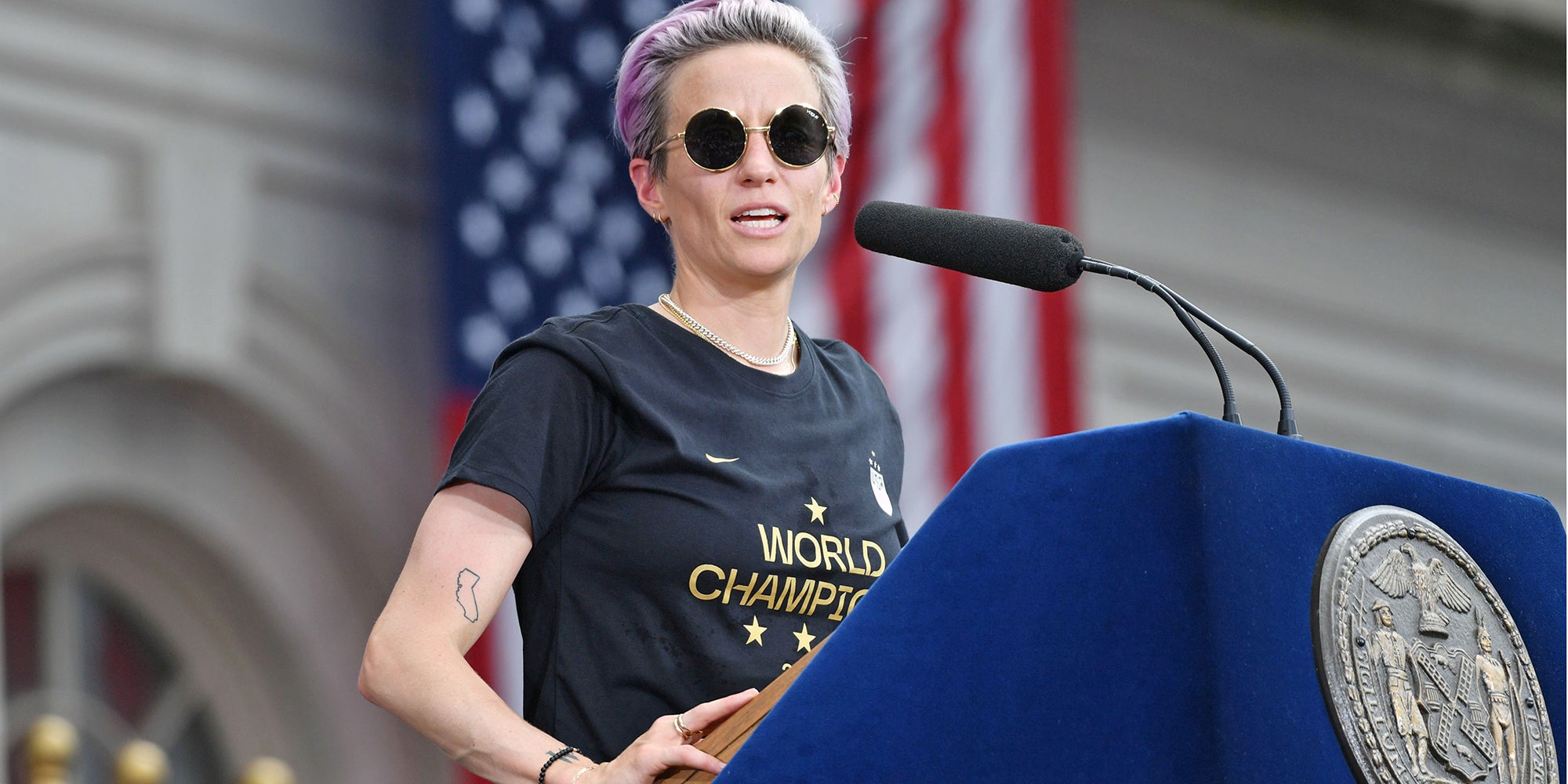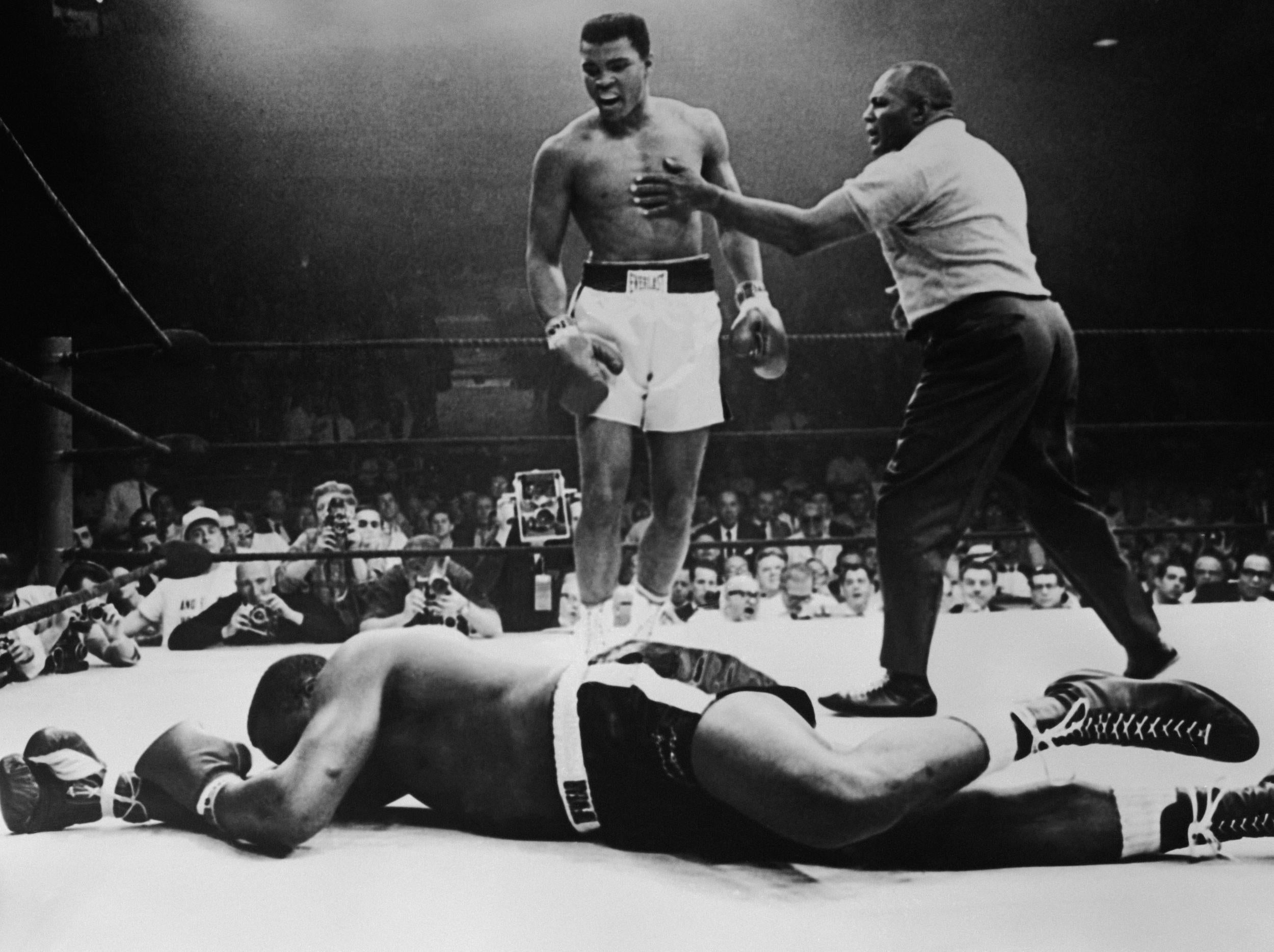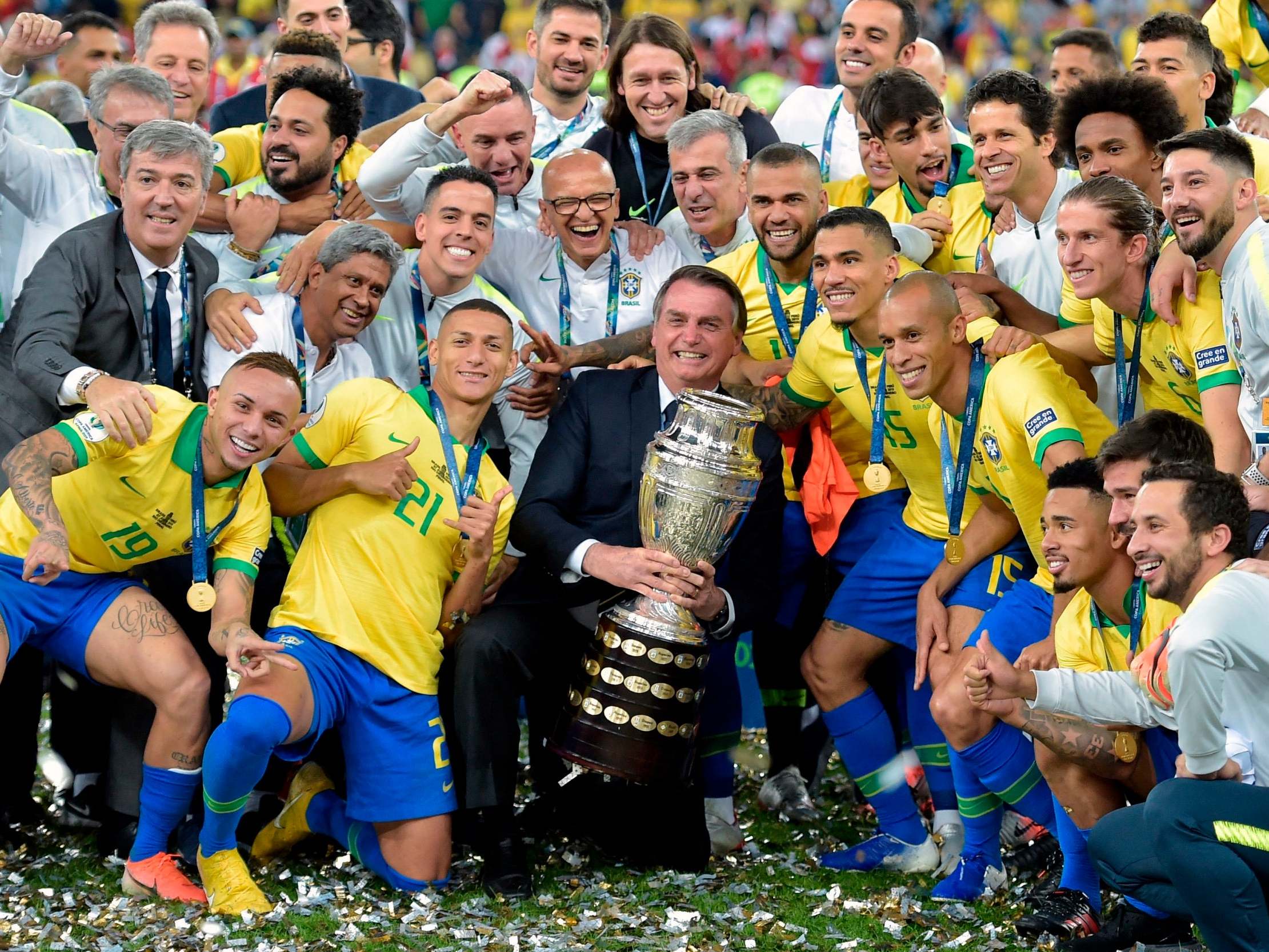Megan Rapinoe: Why World Cup star has seized voice for minority in stark contrast to male game
Many may not like her abrasive approach, but many did not like Ali’s either, as she takes a stand for the LGBTQ community

Your support helps us to tell the story
From reproductive rights to climate change to Big Tech, The Independent is on the ground when the story is developing. Whether it's investigating the financials of Elon Musk's pro-Trump PAC or producing our latest documentary, 'The A Word', which shines a light on the American women fighting for reproductive rights, we know how important it is to parse out the facts from the messaging.
At such a critical moment in US history, we need reporters on the ground. Your donation allows us to keep sending journalists to speak to both sides of the story.
The Independent is trusted by Americans across the entire political spectrum. And unlike many other quality news outlets, we choose not to lock Americans out of our reporting and analysis with paywalls. We believe quality journalism should be available to everyone, paid for by those who can afford it.
Your support makes all the difference.In 1974, in a reversal of events happening right now, Muhammad Ali accepted an invitation to the White House. The events weren’t a reversal, however, because Ali actually agreed to the proposition from the sitting president – at that point, Gerald Ford. They were a reversal precisely because Ali had come through it all – all the rancour, all the upheaval, all the controversy – to the other side.
The then 32-year-old had just beaten George Foreman in the Rumble in the Jungle, to finally reclaim the world heavyweight title after seven years, and assert his legacy as perhaps the greatest athlete in history. That status, of course, was down to so much more than having the resilience to recover and reclaim the belt.
It was because he’d effectively sacrificed his title eight years earlier by taking a political and moral stand in refusing to be drafted for the Vietnam War, bringing his social action to new heights. There have rarely been athletes so talented that represented so much, most of all a hero for black America at the height of the civil rights struggle.
Ali did not just live through the most interesting times. He consciously influenced them, and thereby his own legacy. It’s worth recalling how quickly Ali went from one of America’s most hated figures to one of the most beloved. Making history vindicated him.
Ford told Thomas Hauser in the brilliant book, ‘Muhammad Ali: His Life and Times’ that inviting Ali to the White House was “part of my overall effort to heal the wounds of racial division, Vietnam and Watergate” in a nation “pretty much torn apart”.
The long-term success of that is debatable, given that these were all just the seeds for the divisions of today, and the more divisive attitude of America’s current president. Which brings us to current athletes, and specifically footballers.
It is remarkable that, at a time of probably the most profound culture war since Ali’s experiences in the 1960s – when we have a climate crisis, Donald Trump, Brexit, the resurgence of the far right and so much global upheaval – Megan Rapinoe so stands apart within the sport in speaking out.
The very fact that football has become such big business that it attracts all level of geopolitical interest - to the point of Qatar and UAE using clubs as state vehicles – make this all the more relevant.
And if anyone makes the mistake of thinking it’s ridiculous to compare any such modern player to someone of Ali’s historic gravitas, it’s worth remembering what she actually represents. Just as Ali was a symbol for black America, Rapinoe is a symbol for the LGBTQ community, which has faced some of the same struggles for equality.
She after all represents a country where a sizeable minority of those eligible to vote think she is going to hell, including one former teammate.
Many may not like her abrasive approach. But many did not like Ali’s either.
This is of course personal to Rapinoe, and brave of her, just as it was with Raheem Sterling speaking out about media coverage of black players or James McClean with his understandable refusal to wear the poppy.

And that is relevant to thousands of male players who refuse to say anything much at all.
Footballers obviously have absolutely no responsibility to be role models, and there is of course the very fair argument over why anyone should be in any way interested in what they have to say politically, but the real point here is that it’s simply inconceivable – by the sheer maths of it all – that more players don’t have at least some views on any of this.
Eric Dier posts a one-word tweet and is instantly hailed as the voice of a generation.
The bar is that low.
So where are they?

Of the limited political views we do know, one of the most prevalent around the Premier League is that a conspicuous number of players vote Conservative. That usually isn’t related to wider policies, but really just how it related to the bottom line: how much they’ll be taxed. Similar is said of the many Brazilian players – and, in many cases, bona fide legends – openly supporting Jair Bolsonaro, a figure routinely described as a fascist.
That the current national squad so willingly celebrated their Copa America win with him on the same day that the USWNT won the World Cup only made Rapinoe’s stance more laudable, and striking.
And for those who will respond that articles like this are only written about the “right” – or, more accurately, progressive left – political opinions, it’s not like there has been much articulation of why so many Brazilian footballers support Bolsonaro.
Heurelho Gomes, held up by everyone who knows him as a very decent and well-meaning person, offered a fairly mealy-mouthed explanation for his own surprising support for Bolsonaro in an interview with The Independent.
“We need a change in Brazil,” he remarked. “And he was the one and only one that can change the way. I probably don’t support the whole of his ideas. But I support the change…we need a change.”

Asked about how he can support a man who has spoken so hatefully towards women, black people and the LGBTQ community, Gomes merely argued misrepresentation, before insisting that the very numbers voting for Bolsonaro is vindication for his morality.
“You know how you can turn a piece in a big article. And people are taking that, from the past,” he argued. “His opponents take that and start to feed [it to] people… But how are you going to [get the] support of the 60% [55%] of Brazil that supported him. But how are you going to [get that] support, if someone is like this, like the people are saying? No way. The people are very clever. The people are very clever. He didn’t use the media or television, to make his campaign. Just. Say no more.”
It seems many footballers feel the same way.
Jamie Carragher – who has been one of the more politically outspoken footballers and openly admits he votes Labour, and is Remain – told Simon Hughes in the book ‘Ring of Fire’ that he can understand why so few footballers do.
‘I’m not going to sit here and say what we should do about immigration, housing or foreign aid. I haven’t got a clue, really,” Carragher is quoted. “I watch Newsnight now and again, and sometimes I watch Question Time if there’s no Thursday-night footy on the TV. But all I know is, where I came from people had f*** all and they’ve still got nothing…
“Politics to me is simple. The Tories are for the people who have got a few quid and Labour is for the people who haven’t. Now I’m in a position where I have a few quid. With the 23 Foundation [Carragher’s charity], we give away food hampers at Christmas because some families can’t afford a dinner in Liverpool.”

For all his self-deprecation, Carragher displays a keen political awareness, but one that must also be shared by more professionals.
One agent privately concurs with the Liverpool legend’s view. “Some of my players would maybe feel they wouldn’t want to embarrass themselves by being single-issue knowledgable, at best.”
There is also a sense that it could bring needless trouble, and criticism, especially given the very upheaval and divisiveness of 2019 politics. Some don’t want the negative effect on their commercial power. Others just don’t want the negative effect on their lives.
One hugely high-profile figure currently employed at the top level of the English game game is known to be avowedly Remain, and despairs at the current situation. When pressed by influential political figures on why he doesn’t use his position for effect, he agonised over the hassle.
You can only assume that, since then, he’s seen the response Rapinoe has got.
It seems that, for the time being, she’s going to stand alone in speaking aloud.
Join our commenting forum
Join thought-provoking conversations, follow other Independent readers and see their replies
Comments